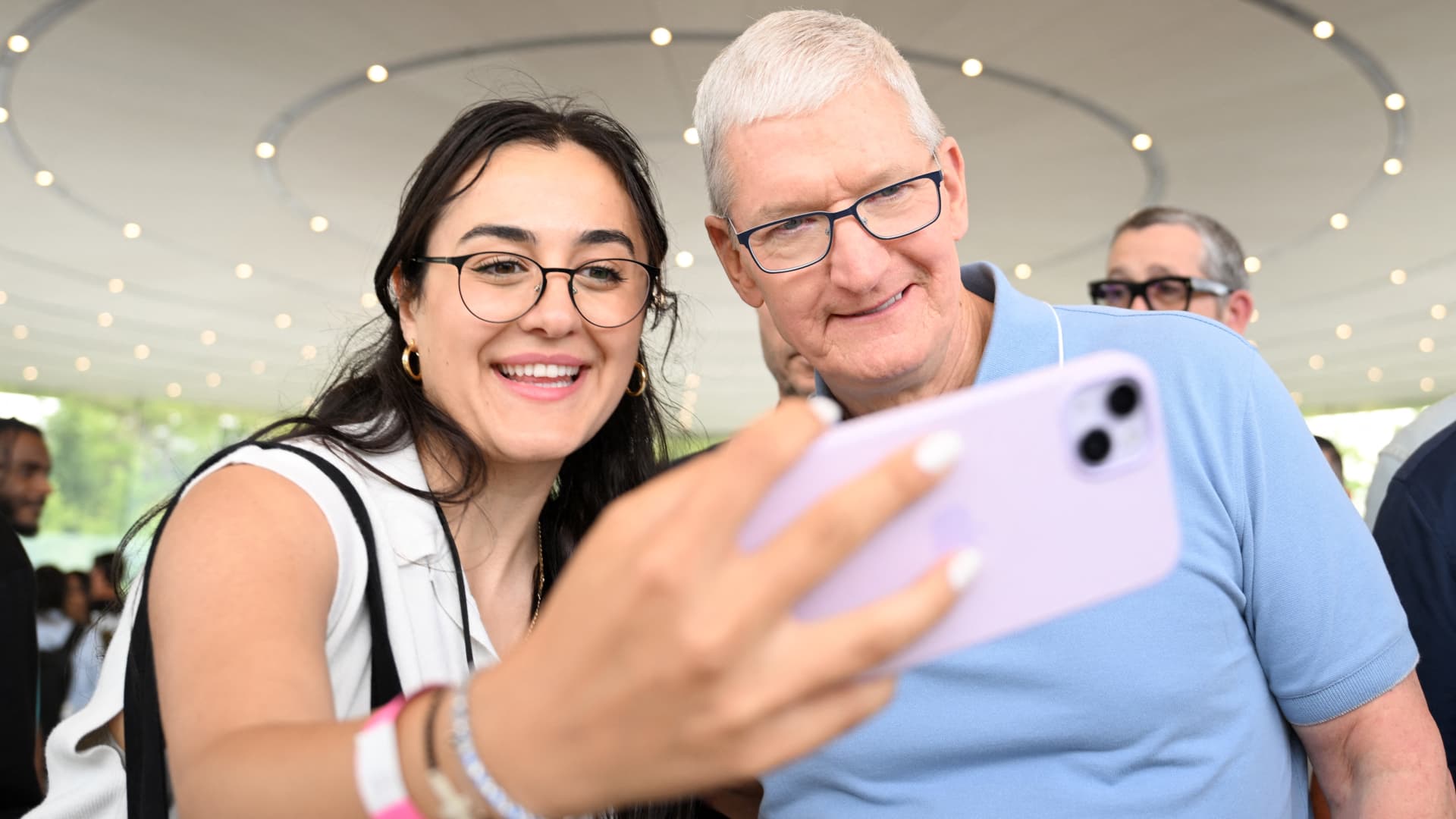
Apple CEO Tim Cook takes a photo in a viewing area for new products during Apple’s Worldwide Developers Conference at the Apple Park campus in Cupertino, California, June 5, 2023.
Josh Edelson | AFP | Getty Images
In June, Apple announced iOS 17, the latest version of the iPhone operating system. Now, it’s available in a public beta form and it’s free for iPhone owners to try.
Keep in mind, this is a beta version, intended as a preview of the final software, so Apple can get help finding and squashing bugs before it’s officially released to the wider public.
In the fall, alongside new iPhones, Apple will officially release the software to everyone with a compatible iPhone. Apple recommends users who aren’t comfortable with beta software to wait until then.
Still, for people who like to live on the bleeding edge, Apple’s public beta for iOS allows them to get a preview of what all iPhones will look like in a few months — as long as they have an iPhone XS, released in 2018, or newer.
There’s a new process for installing the public beta. Instead of enrolling on Apple’s website and installing a configuration profile, you can simply go to Settings > General > Software Update and choose to install a beta version of iOS from the drop-down menu.
Here are some of the biggest changes in iOS 17.
Contact posters. One of the most noticeable changes in iOS 17 will be that you can choose a picture and font to change how you appear when you call another iPhone user. You can create your own “contact poster” in the same way you’d customize your own lock screen.
Better autocorrect. Apple’s autocorrect has been revamped with a new transformer-based language model, Apple said. This should improve accuracy and even improve grammar on the sentence level.
iMessage improvements and interface revamp. Apple’s text messaging app has gotten one of its biggest updates in years. The most visible change will be that the interface has hidden apps such as stickers or the camera, which now exist inside a menu on the left-hand side, as opposed to on the top of the keyboard. Apple also improved message search, stickers and will automatically transcribe short audio messages.
Source: Apple
Journal app. iOS 17 includes a new Journal app that will encourage users to type in a few thoughts every day, and then uses on-device machine learning to intelligently prompt the user to write more about their memories, people, music or photos. This is supposed to come later, so you won’t see it in this beta.
Apple Standby.
Source: Apple
New standby dock mode. When users place their iPhone horizontally on a wireless charger, instead of the same old lock screen, it will display a new interface with widgets such as a calendar or clock, alarms and other real-time information. It’ll be super helpful for folks who want to use their iPhone as a bedside clock.
Business card replacement. A new feature called NameDrop allows two iPhone users to share contact details by simply bringing their phones close together.
Mental health features in the Health app. Inside Apple’s Health app, users can log their daily moods and emotions as well as access tests and other assessments used to diagnose depression and anxiety.
Offline maps. Apple will add the ability to download and use maps offline in iOS 17. While Google Maps has offered the feature for years, this is the first time Apple has enabled it. Maps can be downloaded for entire regions.
AirPods Pro, 2nd generation.
Sofia Pitt
New AirPods features. Users with AirPods Pro will find new capabilities enabled through the new iOS. The biggest new feature is called Adaptive Audio, which uses machine learning and other software to analyze what you’re listening to and the sounds around you, and intelligently turns down the volume in your headphones to give you better awareness of your surroundings.
Don’t have to say “Hey” to Siri anymore. Apple has made the command to awaken its voice assistant shorter.
Photos recognizes pets as their own person. Apple’s machine learning has been able to detect cats or dogs in photos for a few years, but now it can identify individual pets and put them in their own photos folders. So, if you have two dogs, Apple Photos can tell the difference between the two in search and other applications.
Grocery lists in Reminders. Apple’s Reminders app can now take an unstructured list of groceries and automatically sort them into categories such as produce, frozen foods or dairy. It should make shopping more efficient.
Phone is too close to face. Apple also built in a detector called Screen Distance that can warn users their face has been too close to their phone for extended periods of time. It’s built into Apple’s Screen Time feature.
Apple Voicemail transcription.
Source: Apple
A new reason to leave voicemails. A new feature called Live Voicemail will show an iPhone user a transcription of a voicemail being left in real time so they can decide to pick up the call anyway.
FaceTime voicemails. Apple has added voicemail support for the first time for FaceTime calls. Previously, you could send the other person a text message.
Better two-factor authentication. One of Apple’s most-beloved features is that it automatically takes two-factor codes from text messages and drops them into the appropriate box on websites and in apps. In iOS 17, Apple will be able to automatically input two-factor authentication codes from emails received in the Mail app.
Smooth transitions in Apple Music. Apple Music has added the ability to cross-fade between tracks, or have the first one fade out at the end as the new song starts to fade in. Users will also be able to collaborate on playlists, something Spotify has offered for years.